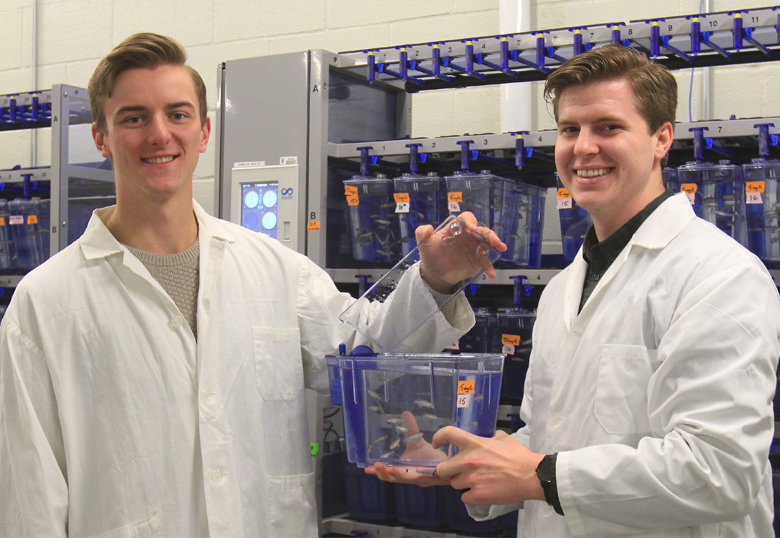Two University of Lethbridge biology students earned first-place awards for their research at the recent 40th annual North American Meeting of the Society of Environmental Toxicology and Chemistry, the largest yearly gathering of environmental toxicologists in North America.
Darren Van Essen, a fourth-year student, was awarded first place in the undergraduate poster presentation competition, and Justin Miller, a master’s student presenting his undergraduate research, was awarded first place in the undergraduate oral presentation competition. Both are supervised by Dr. Steve Wiseman, a biological sciences professor.

“I was pleasantly surprised,” says Van Essen. “Dr. Wiseman’s lab has been a perfect fit for me and I’ve had many different opportunities, including conducting research and attending conferences.”
“I’ve never done an oral presentation at a conference this size,” says Miller. “I was shocked when my name popped up, I was very excited.”
“The University of Lethbridge produces great undergraduate students and Darren and Justin are no exception,” says Wiseman. “They have worked hard on their research so it’s nice for them to be rewarded. Seeing my students be successful is the most rewarding aspect of my job.”
“I’m using zebrafish embryos to determine if a flame-retardant chemical is toxic to fish,” Van Essen says. “I found that it increases mortality, decreases heart rate and increases developmental malformations.”
Van Essen also used gene expression to investigate mechanisms of effects of exposure. He continues to examine the effects of the same chemical for his honours thesis.
Miller also used a zebrafish model to study the effects of dicamba, a herbicide used to control broadleaf weeds.
“I was building off of my previous project where I used rainbow trout to see how their liver cells responded to dicamba exposures,” says Miller. “I wanted to do a multi-species comparison. I took zebrafish embryos and exposed them to dicamba and I looked into the methylation profile of the genome in early life stages of zebrafish.”
DNA methylation can affect gene expression, which can alter physiological processes, but does not alter the genome. In zebrafish, Miller found exposure to dicamba didn’t cause early life malformations or changes in heart rate or gene expression. He found no alteration of the methylation profile in rainbow trout liver cells.
“Negative results are still results and they push research forward,” Miller says. “Dicamba is detected in many freshwater systems in southern Alberta. It’s nice to see that a chemical which is valuable to our agricultural industry might not pose a threat to freshwater fishes. Of course, more research is needed to fully understand this.”
Van Essen, who grew up on a farm near Picture Butte, chose to attend the U of L because of its Research Internship Concentration, which offers students the opportunity to be involved in biological research in their first year and to build their research skills in subsequent years.
“The Research Internship has made a huge difference in terms of meeting other students and professors and getting involved in research in various labs,” says Van Essen. “By the time I reached my fourth year, I’d already worked on multiple research projects. It gave me a lot of background that’s important for my thesis.”
Through his involvement with the program, Van Essen discovered he preferred working with an animal model. Wiseman’s lab allowed him to combine his interests in using an animal model and molecular biology, providing him with the material for his poster presentation in the process.
Both Van Essen and Miller credit Wiseman for giving them the opportunity to be involved in research and to develop research projects based on their own interests.
“Having two undergrads produce such strong work that’s recognized is really a testament to both the U of L and especially Dr. Wiseman’s commitment to producing strong undergraduate researchers,” says Miller.
The awards provide Miller and Van Essen with complimentary registration for next year’s conference in Fort Worth, Texas.
